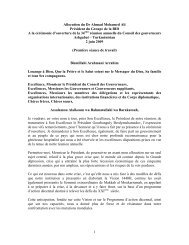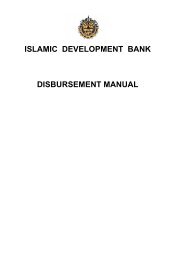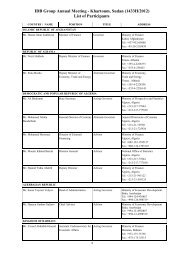Mauritania - Islamic Development Bank
Mauritania - Islamic Development Bank
Mauritania - Islamic Development Bank
Create successful ePaper yourself
Turn your PDF publications into a flip-book with our unique Google optimized e-Paper software.
Integrated Rural <strong>Development</strong> programs,<br />
involving community participation. This strategy<br />
was to be implemented through a set of policies<br />
and in a coordinated and decentralized manner:<br />
(i) promotion of the main agricultural value chains<br />
wedged on the macroeconomic framework and<br />
targeting quality products and Diversification;<br />
(ii) development of rural infrastructure, (iii)<br />
institutional strengthening and organization of<br />
the sector, and (iv) policies to protect natural<br />
resources.<br />
81. For the livestock sector, the main objectives<br />
of the Government inscribed in the 2009 Policy<br />
Letter are: (i) to increase the sector’s growth in a<br />
sustainable manner and with redistribution, and<br />
(ii) to reduce vulnerability of households living<br />
from livestock, in accordance with the guidelines<br />
of the PRSP.<br />
82. The Action Plan for the PRSP III (2011-2015)<br />
proposes an investment program for the rural<br />
sector covers that would cost UM 155billion,<br />
equivalent to approximately USD 584 million,<br />
in combination with a strong emphasis on the<br />
role of the private sector. This program aims at<br />
improving productivity and incomes in the sector<br />
and is concentrated in the regions where the<br />
poorest populations live.<br />
83. IDB Group and all other donors fully<br />
agree and support the above government<br />
strategies, which have been consistent for<br />
the last 15 years. The problem <strong>Mauritania</strong><br />
faces is the government inability to fully and<br />
truly carry out the implementation of these<br />
strategies and to take all the measures that<br />
are recommended. High turnover of decision<br />
makers and senior government agencies staff<br />
and general mismanagement have been the main<br />
impediments. There are also questions about<br />
the continuing need to subsidize agriculture in<br />
irrigated areas.<br />
3.5 Proposed IDB Group Interventions<br />
84. Agriculture and rural development requires<br />
a multi sector and integrated approach.<br />
Government support to agriculture alone has<br />
shown its limits especially in irrigated areas.<br />
Given the lessons learned from the past showing<br />
lack of impact of major government interventions,<br />
including subsidies, there should be an early end<br />
to subsidies and to Government interventions in<br />
irrigated agriculture except where justified on an<br />
exceptional basis and the private sector should<br />
be encouraged to take a lead role 7 . Instead,<br />
the focus of government interventions should<br />
now be on rain fed agriculture to enhance food<br />
security and reduce poverty. With this view, the<br />
Government should encourage a supply chain<br />
approach (approche filière) to address food<br />
security involving all partners from input supply<br />
to production, processing and market. Production<br />
alone will not guaranty food security and will<br />
not alleviate poverty. All steps in the supply<br />
chain are important and necessary. Agriculture<br />
development remains the top activity for the food<br />
insecure rural communities. IDB Group promotes<br />
such approach in the following areas and intends<br />
to provide financing of about $250 million to<br />
promote the following activities.<br />
(a) In the irrigated areas, IDB would support the<br />
consolidation of rice production system, crop<br />
diversification and intensive dairy farming.<br />
This will be done by improving or rehabilitating<br />
existing irrigated schemes rather than creating<br />
new ones (improving land leveling, irrigation<br />
and drainage and introducing electrification),<br />
securing land tenure and credit, training<br />
farmers and technicians, supporting the<br />
creation and/or maintenance of access road<br />
and transport infrastructure, developing<br />
processing units and securing markets. Priority<br />
products are rice, new crops (diversification)<br />
for local and export markets, and milk. Inland<br />
fishing will be part of the integrated approach<br />
to be adopted.<br />
(b) In the rain fed areas, IDB would support<br />
integrated rural development approach<br />
7 The IDB Group plans to play an important role in promoting the role of the<br />
private sector in irrigated agriculture in <strong>Mauritania</strong>. It will do so both through<br />
ICD and in its interactions with the Coordination Group, to support new models<br />
for Arab-African investment that can benefit from the synergy with Member<br />
Countries that have surplus cash and consumer markets with those that have<br />
the knowledge and know-how (for example, Egypt, Morocco etc.) At the same<br />
time, to facilitate public-private partnerships in agricultural investments,<br />
the <strong>Bank</strong> will be working closely with the Government of <strong>Mauritania</strong> to help<br />
resolve the constraints noted above in Section V.3.2 that irrigated agriculture<br />
has faced in the past decade, and continues to face.<br />
MCPS for <strong>Mauritania</strong>, 2011-2015 21






